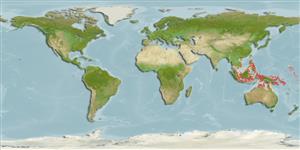>
Gobiiformes (Gobies) >
Gobiidae (Gobies) > Gobiinae
Etymology: Trimma: Greek, trimma, -atos = something crushed (Ref. 45335); fangi: Named for Prof. Lee-Shing Fang, head of the Museum of Marine Biology & Aquarium..
More on authors: Winterbottom & Chen.
Environment: milieu / climate zone / depth range / distribution range
Ecologia
marinhas associadas(os) a recifes; intervalo de profundidade 5 - 20 m (Ref. 90102). Tropical
Western Pacific: Anambas Islands, South China Sea.
Tamanho / Peso / Idade
Maturity: Lm ? range ? - ? cm
Max length : 2.1 cm macho/indeterminado; (Ref. 51083)
Descrição suscinta
Morfologia | Morfometria
Espinhos dorsais (total): 6 - 7; Raios dorsais (total): 9; Espinhos anais 1; Raios anais : 8. Diagnosis: Distinguished by the combination of following features: predorsal scales absent; anterior extension of body scales up to the shoulder spot; body light brown with large orange spots or stripes on the head; a dark greyish-orange shoulder spot above the pectoral fin base; and a grey iris with several orange spots. These orange spots on head are grading to red on the branchiostegal membrane (Ref. 51083); characterized further by having longitudinal scale series 23-25; cheeks and opercle without scales; depth of body 3.8-4.2 in SL (Ref. 90102).
Inhabits outer reef caves and crevices in 5-20 m (Ref. 90102).
Ciclo de vida ou comportamento de acasalamento
Maturidade | Reprodução | Desova | Ovos | Fecundidade | Larvas
Winterbottom, R. and I.-S. Chen, 2004. Two new species of Trimma (Teleostei: Gobiidae) from the western Pacific Ocean. Raffles Bull. Zool. 11(Sup.):103-106. (Ref. 51083)
Status na Lista Vermelha da UICN (Ref. 130435)
Ameaça para os humanos
Harmless
Uso pelos humanos
Mais informação
Nomes comunsSinônimosMetabolismoPredadoresEcotoxicologiaReproduçãoMaturidadeDesovaAgregação de desovaFecundidadeOvosDesenvolvimento dos ovos
Idade/TamanhoCrescimentoPeso-comprimentoComprimento-comprimentoFrequências de comprimentoMorfometriaMorfologiaLarvasDinâmica larvalRecrutamentoAbundânciaBRUVS
ReferênciasAquaculturaPerfil para aquaculturaEstirpesGenéticaElectrophoresesHereditariedadeDoençasProcessamentoNutrientsConversão de massa
ColaboradoresFotosStamps, Coins Misc.SonsCiguateraVelocidadeTipo de nataçãoÁrea branquialOtólitosCérebrosVisão
Ferramentas
Relatórios especiais
Baixar XML
Fontes da internet
Estimates based on models
Preferred temperature (Ref.
123201): 28 - 29.2, mean 28.8 °C (based on 952 cells).
Índice de diversidade filogenética (Ref.
82804): PD
50 = 0.5000 [Uniqueness, from 0.5 = low to 2.0 = high].
Bayesian length-weight: a=0.01023 (0.00477 - 0.02194), b=3.02 (2.84 - 3.20), in cm total length, based on LWR estimates for this (Sub)family-body shape (Ref.
93245).
Resiliência (Ref.
120179): Elevada, tempo mínimo de duplicação da população menor que 15 meses (Preliminary K or Fecundity.).
Fishing Vulnerability (Ref.
59153): Low vulnerability (10 of 100).
Nutrients (Ref.
124155): Calcium = 404 [175, 1,278] mg/100g; Iron = 1.74 [0.76, 3.79] mg/100g; Protein = 18 [16, 20] %; Omega3 = 0.168 [0.055, 0.478] g/100g; Selenium = 27.3 [8.7, 74.6] μg/100g; VitaminA = 135 [29, 638] μg/100g; Zinc = 4.62 [2.54, 7.68] mg/100g (wet weight);
